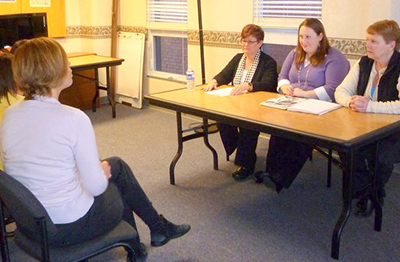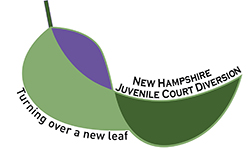Community Health Institute Selected as Partner

We are pleased to announce that Community Health Institute, Bow, New Hampshire has been selected by the State Advisory Group on Juvenile Justice to work with the NH Juvenile Court Diversion Network over the next year on strengthening the sustainability of diversion programs. Lead researcher, Rachel Kohn, MSW, MPH will be working with Betsy Houde, […]
Network Welcomed at Police Chief’s Meeting

NH Juvenile Court Diversion Network Chair Nicole Rodler presented to the NH Police Chief’s Association at their October monthly meeting at Hampton Police Department. Previously unaware that there are no diversion programs available to youth in the North Country and other pockets of the state, the Chiefs were very receptive to the grant update provided […]
Chair Testifies Before Child and Family Law Committee

On Oct. 15th 2013, The Juvenile Diversion Network testified before the Child and Family Law committee on House Bill 572 calling for a Study Commission to study public-private partnerships for the treatment of children. While Grafton County Attorney Lara Saffo spoke primarily on the effectiveness of NH’s Restorative Justice Practices. Nicole Rodler, NH Juvenile Diversion […]
Committee Releases Report In Support of Network

On November 1, 2013, The Child and Family Law Committee submitted a report under HB 418, Chapter 44:1, Laws of 2013. Their Memorandum, widely and broadly supported testimony from the NH Juvenile Court Diversion Network. The report, also included key recommendations for Juvenile Diversion, and called for elemental and specific findings in seeking to address […]
Prosecutors Benefit from Direct Network Training

As part of the NH Police Standards and Training Courses, Officers are provided a combination of working knowledge and practical experience in the role of Police Prosecutor. Topics include substantive and procedural law, U.S. and N.H. Supreme Court decisions, and juvenile-related law. Practical exercises in pre-trial motions, responding to motions, probable cause and suppression hearings, […]
CHI Completes State-By-State Diversion Review

On behalf of the New Hampshire Juvenile Court Diversion Network, the Community Health Institute embarked on a review of juvenile diversion approaches and strategies being used in the United States. The resulting document is this State-by-State Diversion Review (SbS Review) which provides a summary of diversion structures in 51 local state government’s (District of Columbia […]
Governor Hassan Creates Juvenile Justice Commission

CONCORD – In order to improve New Hampshire’s juvenile justice system and ensure that at-risk youth receive the support that they need to rehabilitate and become successful members of society, Governor Maggie Hassan today issued an Executive Order creating the Governor’s Commission to Review and Advise on Services to At-Risk Adolescent Youth in New Hampshire. […]
Restorative Justice More Than A Simple Apology

On November 18th, WMUR reported on a teen driver that crossed the center line and struck two women. The report generated a flurry of responses, because the teen’s lawyer was requesting “restorative justice, under which he would apologize to the victims instead of serving jail time”. Given that definition — which grossly under-represents the impact […]
Children who start fires can be helped

From Foster’s Daily Democrat by Kimberley Haas [email protected] CONCORD — Children who light fires get special attention from state officials because of the damage and loss of life they can cause to themselves and others. Sheryl Nielsen, M.Ed., a public education specialist with the Fire Marshal’s Office, said the state has diversion programs for youth. […]
Crime Solutions Rates Diversion as “Promising” Strategy

According to CrimeSolutions.gov, Juvenile Diversion is an intervention strategy that redirects youths away from formal processing in the juvenile justice system, while still holding them accountable for their actions. The practice is rated Promising for reducing recidivism rates of juveniles who participated in diversion programming compared with juveniles who were formally processed in the justice […]
